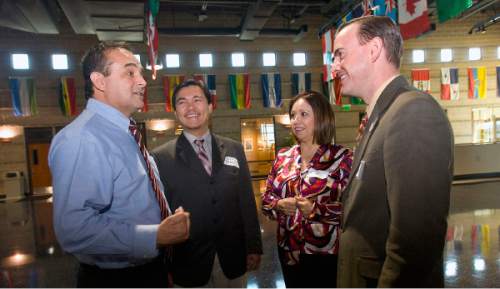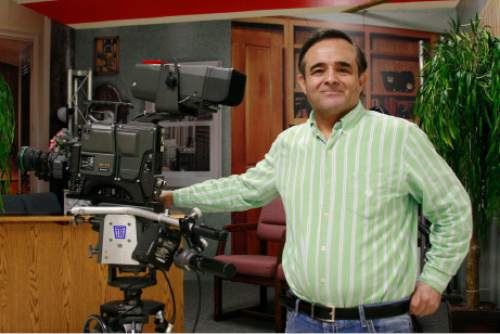This is an archived article that was published on sltrib.com in 2015, and information in the article may be outdated. It is provided only for personal research purposes and may not be reprinted.
Ernesto "Kiko" Cornejo, who for more than 30 years was a fixture in Utah's Latino immigrant community through radio and television programs and work for police forces where he advocated following the law, died early Friday at his home in Woods Cross. He was 63.
His daughter, Shantel Cornejo, said Cornejo died of complications from throat cancer. Doctors were able to cure the cancer, but radiation treatments prevented him from speaking and obstructed his breathing, she said.
His ex-wife, Giselle Cornejo, said his illness this year prevented him from throwing what had been the annual International Christmas Celebration in West Valley City where he would distribute gifts to children and state troopers would deliver Santa Claus on the back of a motorcycle.
Cancer also interrupted Cornejo's regular talk shows, which most recently aired in Spanish along the Wasatch Front on television station 23 and radio station 1600 AM, though he had shows on other channels over the years. Kiko Cornejo, as he called himself on the air, sought to educate Latinos on everything from U.S. immigration policy to Medicaid expansion, but a recurring theme was the law and public safety.
Cornejo's volunteering often blurred with his gainful employment. He worked as a civilian doing community outreach for the Salt Lake City Police Department from 1998 through 2003 and then at the Utah Department of Public Safety until 2008.
Cornejo tried to explain the need for people recently arriving in the United States to avoid everything from driving too fast to using violence. It was a lesson he learned shortly after emigrating from Chile.
Cornejo accumulated three speeding tickets. In Chile, the tickets would not have been enforced — if a police officer had bothered to issue them at all. In the United States, Cornejo's driver license was suspended.
"I didn't know the rules," Cornejo told The Tribune in 2005.
Keith Squires, the director of the Utah Department of Public Safety, attended a few of Cornejo's Christmas festivals and worked with him when Cornejo had a job with the agency's highway safety division. Squires on Saturday said Cornejo had a passion for educating immigrants and keeping them safe.
Squires called Cornejo "one of these individuals that was doing something about it because he genuinely cared."
Ernesto Enrique Cornejo was born Sept. 26, 1952, in Romeral, Chile. He was the fifth of 10 children. In Latin America "Kiko" is shorthand for Enrique, and people began calling Cornejo by that name at an early age.
He served a mission in Chile for The Church of Jesus Christ of Latter-day Saints. He decided to emigrate in 1979, Giselle Cornejo said. He went first to New York, but was there only about a year before deciding to go to Salt Lake City because, Giselle Cornejo said, that's where other Mormons were.
The experience with the speeding tickets showed Cornejo the need for educating immigrants. Not long after arriving in Salt Lake City, Giselle Cornejo said, he approached a Spanish-language radio station about starting a show. Cornejo had no media training, but the station needed programming and let him go on the air.
He later founded the Utah Minority Community Information and Education Center, which later became the Latino Community Information and Education Center. It included a hotline where Spanish speakers could call with questions about interacting with the government, everything from how to obtain a Social Security card to what to do about an employer who is refusing to pay them.
In 2005, the FBI gave Cornejo the Director's Community Leadership Award for his work.
Cornejo urged Latinos to assimilate to the United States, but to maintain their culture and said to do so required education.
Shantel Cornejo said while her father advocated respect for the law, he often had to counsel people who were in the country without authorization. She said Cornejo told such people to be honest if they encounter immigration agents, but the immigrant should also explain he or she has a job, family that is here and other ties to the community and that he or she is trying to build a better life.
"He would always tell them to do everything the correct way," Shantel Cornejo said.
Giselle and Kiko Cornejo had been together 31 years, she said Saturday, though the couple divorced in 2002. Cornejo's other survivors include seven siblings; Shantel Cornejo and two other daughters, Stephanie and Nikki Cornejo; and two grandchildren.
Services are pending.
Twitter: @natecarlisle





